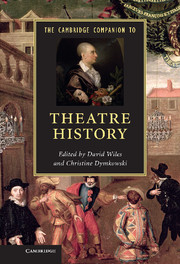1 - Why theatre history?
from Part I - Why?
Published online by Cambridge University Press: 05 February 2013
Summary
We, the editors and contributors to this volume, are united by a shared conviction that history matters. We all wish to resist ‘presentism’, which may be defined as a belief that the past is irrelevant because its inhabitants, people just like us, are now irretrievably gone. We sense that our students are disempowered by their lack of appropriate maps of the past, yet we find it difficult to endorse standard accounts of the theatrical past because we have a different set of priorities. We find it a challenge, using available textbooks, to engender passion about the past, because these books do not explain why the past should matter to us, in the here and now. This lack of intellectual engagement with the theatrical past is a rather surprising state of affairs given that, in the domain of mass culture, there is a vast public following for historical novels and films, for museums and for heritage sites.
In the political domain there is a clear perception that history matters. When the contributors to this volume gathered for a conference in London in the summer of 2010, the teaching of history was being debated in the wider world. Niall Ferguson, a controversial historian of empire, drew media attention at a literary festival because the incoming Conservative Minister of Education, Michael Gove, leapt up and invited him to help shape the new schools curriculum. In his speech Ferguson lamented that his children had left school having learned history only in fragments, their knowledge seemingly confined to Henry VIII, Adolf Hitler and Martin Luther King, isolated moral case studies that offered no sense of how historical events interconnect. The left-wing press was fierce in its condemnation. The New Statesman, for example, concluded its attack on Ferguson and the new government by declaring that
Michael Gove’s wish to re-engineer how history is taught to children is, quite simply, about social control. It is part of a broader political discourse that seeks, ultimately, to replace the messy, multivalent web of Britain’s cultural inheritance with one ‘big story’ about dominance and hierarchy, of white over black, west over east, rich over poor. But history is not about the big story, the single story, the story told by the overculture. History is not about ‘celebrating’ the past, nor about making white kids feel good about their cultural inheritance. History is a process of exploring the legacy of the past, and questioning it – including the ugly, uncomfortable parts. No wonder the Tories want to tear it up and start again.
- Type
- Chapter
- Information
- The Cambridge Companion to Theatre History , pp. 3 - 6Publisher: Cambridge University PressPrint publication year: 2012

